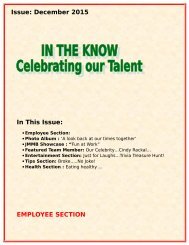Create successful ePaper yourself
Turn your PDF publications into a flip-book with our unique Google optimized e-Paper software.
that it enables you to make informed choices about your dietary, exercise, supplement, and even<br />
medical treatment plans. With the blood type "road map," these plans can now "correspond to your<br />
exact biological profile" and "the dynamic natural forces within<br />
Type O-People with type O blood fare best on intense physical exercise and animal proteins and less<br />
well on dairy products and grains, says Dr. D'Adamo. <strong>The</strong> leading reason for weight gain among Type<br />
O's is the gluten found in wheat products and, to a lesser extent, lentils, corn, kidney beans, and<br />
cabbage, Dr. D'Adamo explains. Ideal exercises for Type O's include aerobics, martial arts, contact<br />
sports, and running.<br />
Type A-Those with blood type A, however, are more naturally suited to a vegetarian diet and foods<br />
that are fresh, pure, and organic. As Type A's are predisposed to heart disease, cancer, and diabetes, "I<br />
can't emphasize how critical this dietary adjustment can be to the sensitive immune system of Type<br />
A," says Dr. D'Adamo. Type A's can derive significant benefit from calming, centering exercise, such<br />
as yoga and tai chi.<br />
Type B-Type B's have a robust immune system and a tolerant digestive system and tend to resist many<br />
of the severe chronic degenerative illnesses, or at least survive them better than the other blood types.<br />
Type B's do best with moderate physical exercise requiring mental balance, such as hiking, cycling,<br />
tennis, and swimming.<br />
Type AB-Blood type AB, the most recent, in terms of evolution, of the four groups and an amalgam of<br />
types A and B, is the most biologically complex. For this group, a combination of the exercises for<br />
types A and B works best, says Dr. D'Adamo.<br />
Blood type, with its digestive and immune specificity, is a window on a person's probable<br />
susceptibility to or power over disease, according to Dr. D'Adamo. For example, Type O's are the most<br />
likely to suffer from asthma, hay fever, and other allergies, while Type B's have a high allergy<br />
threshold, and will react allergically only if they eat the wrong foods. Type B's are also especially<br />
susceptible to autoimmune disorders, such as chronic fatigue, lupus, and multiple sclerosis. Type AB's<br />
tend to have the fewest problems with allergies, while heart disease, cancer, and anemia are medical<br />
risks for them.<br />
With arthritis, Type O's, again, are the predominant sufferers because their immune systems are<br />
"environmentally intolerant," especially to foods such as grains and potatoes which can produce<br />
inflammatory reactions in their joints, says Dr. D'Adamo. Types A and B are the most susceptible to<br />
diabetes, while types A and AB have an overall higher rate of cancer and poorer survival odds than<br />
the other types.<br />
Lectins and Blood Type<br />
A chemical reaction occurs between your blood and the foods you eat. This reaction is part of your<br />
genetic inheritance. It is amazing but true that today, in the twenty first century, your immune and<br />
digestive systems still maintain favoritism for foods that your blood type ancestors ate.



